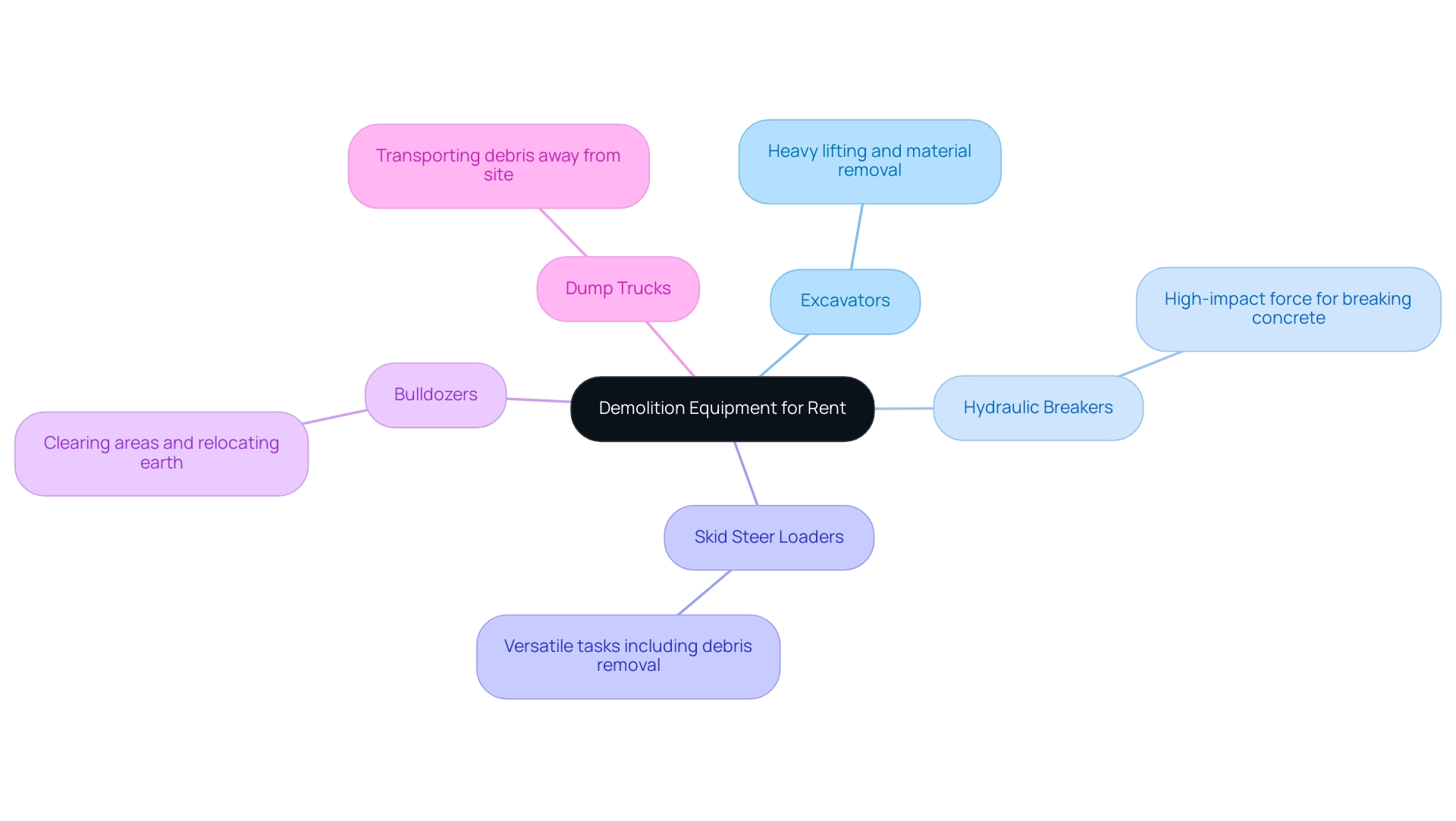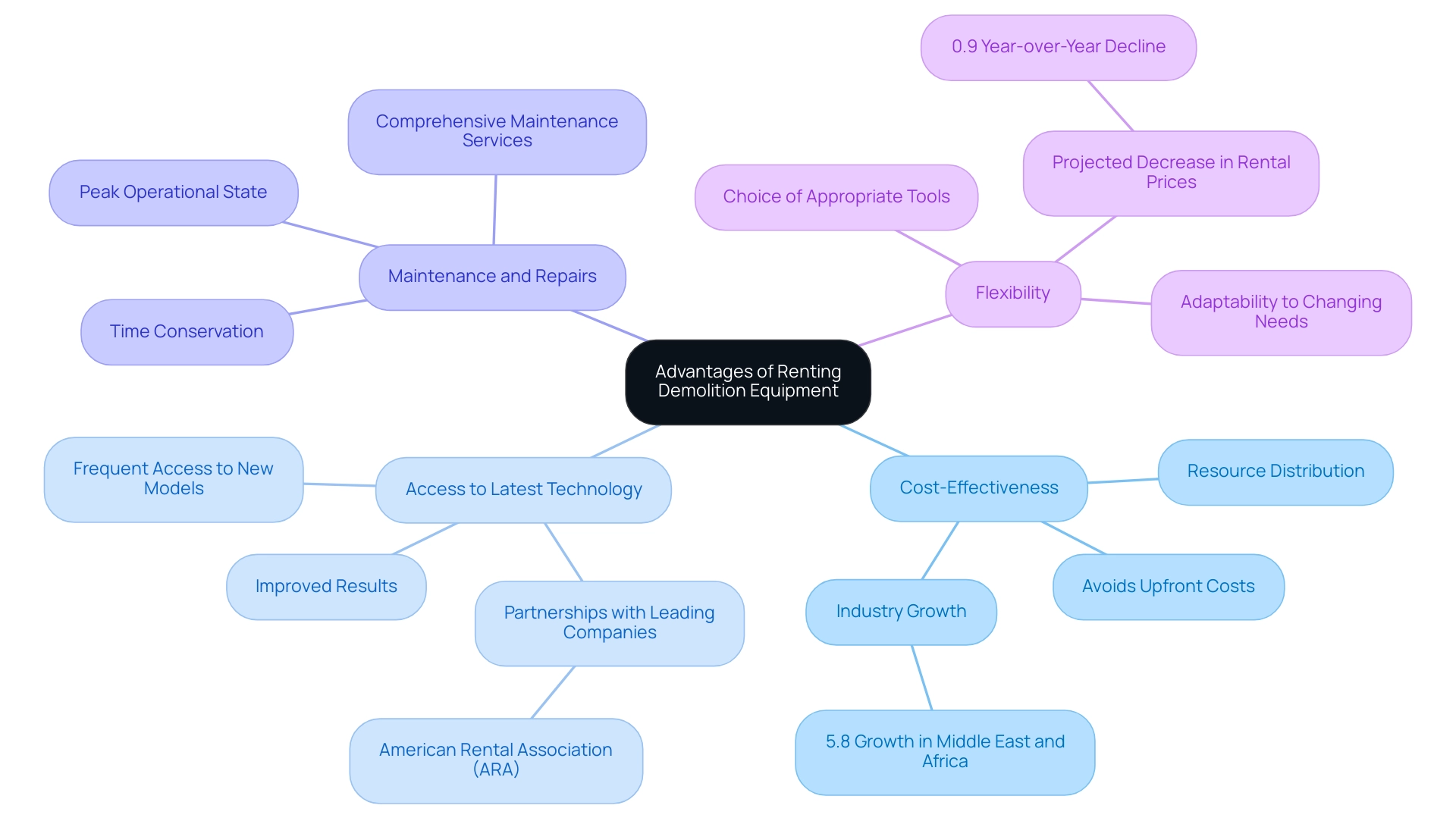Introduction
In the fast-evolving landscape of the construction industry, efficiency and cost management have become paramount, particularly in demolition projects. As urbanization accelerates and the need for innovative solutions grows, contractors are increasingly turning to equipment rentals as a strategic response to both financial and operational challenges. This approach not only alleviates the burden of ownership costs but also provides access to cutting-edge technology that enhances project outcomes.
With a focus on the diverse range of equipment available, the advantages of renting, and key considerations for making informed decisions, this article explores how leveraging rental services can lead to successful demolition endeavors while navigating the complexities of today’s construction demands.
Understanding Demolition Equipment Rentals: An Overview
The rental of demolition equipment rentals involves leasing specialized tools designed for dismantling tasks, a practice essential in the construction sector. With a notable increase in residential housing completions, the demand for efficient construction practices is on the rise. Renting demolition equipment rentals from in Irving, TX, which serves the entire DFW Metroplex, gives contractors a strategic advantage, allowing them to manage costs effectively while gaining access to high-quality technology, including:
- Boom lifts
- Excavators
- Forklifts
- Demolition hammers
This flexibility allows managers to select the right tools for specific tasks, alleviating financial burdens associated with ownership. As the U.S. equipment leasing market reached an estimated $52.7 billion in 2022, the significance of leasing services in construction becomes clear. By utilizing EZ Equipment Rental's varied services and dedication to client satisfaction, construction experts can improve efficiency and resource distribution, ultimately resulting in successful outcomes.
The perspectives from industry specialists highlight the increasing dependence on demolition equipment rentals as a cost control approach, especially in deconstruction projects where accuracy and efficiency are essential. For additional details or to book your gear, reach out to EZ Equipment Rental today at (214) 951-7800.
Types of Demolition Equipment Available for Rent
The market for demolition equipment rentals provides a varied selection of tools and devices, each customized for specific dismantling jobs. In 2024, can find the following commonly leased machinery:
- Excavators: These powerful machines are essential for heavy lifting and material removal, making them a staple in large-scale tearing down efforts.
- Hydraulic Breakers: Designed to deliver high-impact force, hydraulic breakers are particularly effective for breaking concrete and other durable materials, showcasing their crucial role in tearing down projects.
- Skid Steer Loaders: Known for their versatility, skid steer loaders excel in various tasks, including debris removal and site preparation, proving indispensable on tearing down sites.
- Bulldozers: Ideal for clearing extensive areas and relocating large volumes of earth, bulldozers enhance operational efficiency during the tearing down process.
- Dump Trucks: These vehicles play a vital role in transporting debris away from the site, ensuring that the area remains clear and safe for ongoing work.
The demand for these tools reflects a broader trend in the construction machinery leasing market, which has seen a year-over-year growth of 15% in related sectors, such as lawn mower leases. This growth signifies a robust market for demolition equipment rentals, which includes various demolition tools. Furthermore, the incorporation of telematics is transforming asset management, enabling more effective tracking and upkeep of leased units.
As Herc Holdings reports a total revenue of 2.1bn USD, it underscores the financial viability and importance of the rental market. By employing the appropriate tools, project managers can guarantee that their dismantling projects are carried out effectively and securely, ultimately aiding the success of their construction efforts.

Advantages of Renting Demolition Equipment
Renting demolition equipment rentals presents a variety of advantages, particularly for contractors who may not require long-term access to specific machinery. The following key benefits highlight the practicality of this approach:
- Cost-Effectiveness: By choosing to lease, contractors can avoid the substantial upfront costs that come with purchasing equipment. This financial strategy enables improved distribution of resources across initiatives, including demolition equipment rentals. Notably, the in the Middle East and Africa is expected to grow by 5.8% in the coming years, reflecting a broader trend towards leasing solutions.
- Access to Latest Technology: Demolition equipment rentals allow contractors to frequently access the latest models, enabling them to leverage the most advanced and efficient tools available in the market. This access to cutting-edge technology can significantly improve results. As highlighted by the American Rental Association (ARA), partnerships with leading companies in the industry underscore the commitment to providing high-quality leasing options.
- Maintenance and Repairs: Many leasing agreements for demolition equipment rentals include comprehensive maintenance services, thereby alleviating the responsibility of upkeep from contractors. This setup not only conserves time but also guarantees that tools stay in peak operational state.
- Flexibility: Renting enables contractors to choose the appropriate tools suited to each task's distinct needs. This flexibility removes the limitations tied to long-term ownership, allowing for adaptability in a continuously changing construction environment. Furthermore, a recent case study shows that truck, trailer, and RV lease prices are projected to decrease, indicating that leasing costs may provide substantial savings for contractors maneuvering through the financial landscape of tool usage. These factors collectively make the use of demolition equipment rentals a strategic and economically wise choice for professionals navigating the complexities of the construction industry.

Key Considerations for Renting Demolition Equipment
When renting demolition machinery, several essential considerations must be taken into account to ensure success and safety of the task:
- Requirements: A thorough assessment of the specific needs of the demolition endeavor is crucial. This assessment guarantees that the suitable tools are acquired, aligning with project objectives and operational requirements.
- Safety Measures: It is essential to confirm that the leased apparatus complies with the latest safety standards. Equipment should not only be compliant but also in optimal working condition to prevent accidents and injuries on-site. The ongoing efforts in the industry, as highlighted by the ASSP's Development of Workplace Consensus Standards, reinforce the importance of adhering to established guidelines when leasing equipment.
- Agreement Terms: Understanding the leasing agreement's terms is vital. This encompasses a clear understanding of costs, rental duration, and the responsibilities associated with maintenance. Given that Specialty Trade Contractors have the lowest revenues per firm for the smallest size category at $365,018, small contractors must carefully weigh the financial implications of renting versus purchasing tools to avoid unexpected expenses and ensure accountability.
- Training and Support: Ensuring that operators are adequately trained to use the tools safely is paramount. With OSHA estimating that may require non-standard sizes of PPE, customized training becomes crucial to reduce risks linked to size and weight inconsistencies in gear usage.
By considering these factors, contractors can utilize the benefits of renting deconstruction tools while greatly minimizing potential issues during the assignment. As Timothy Schaaf aptly puts it,
There's wisdom in consulting those who've specialized in protecting properties under such circumstances,
emphasizing the importance of expert guidance in navigating these challenges.
Market Trends and Future Outlook for Demolition Equipment Rentals
The machinery leasing market is experiencing notable growth, driven by various crucial trends that pose both challenges and opportunities for construction managers:
- Increased Urbanization: The swift expansion of urban regions considerably boosts the demand for dismantling services, thus elevating the requirement for leased machinery. As cities develop, the frequency of demolition projects increases, requiring a flexible leasing strategy that includes demolition equipment rentals to accommodate diverse project needs.
- Technological Advancements: Innovations such as telematics, motion sensors, and automation are transforming the landscape of demolition tools. These advancements not only enhance operational efficiency but also improve safety on worksites, encouraging contractors to choose leases that feature the latest technology.
- Sustainability Focus: With a growing emphasis on environmentally responsible practices, contractors are increasingly inclined to rent machinery that adheres to green standards. This shift not only aligns with regulatory requirements but also appeals to environmentally conscious clients, making leasing a strategic choice.
- Economic Factors: Economic uncertainties can severely affect contractors' capital expenditures. As firms navigate these fluctuations, the leasing model emerges as a cost-effective alternative to purchasing equipment, allowing for greater financial flexibility.
These trends collectively signal a promising outlook for . Notably, the aerial work platform leasing industry is projected to reach $69 billion by 2030, with a global growth rate of 8.9% from 2024 to 2033. Additionally, the rising trend of construction companies transitioning from ownership to leasing, as reported by platforms like BigRentz, illustrates the evolving dynamics of the industry.
As one of the largest companies in the defense industry stated, 'Thank you for sending the market report and data. It looks quite comprehensive and the data is exactly what I was looking for.' This acknowledgment reflects the importance of accurate market insights for informed decision-making.
Additionally, the recent acquisition of F&B Rentals by LGP Equipment Rentals exemplifies how companies are adapting to market trends, further strengthening the analysis of the industry's evolving dynamics.
As urbanization continues to shape the demand for demolition services, the emphasis on innovation and sustainability will further enhance the appeal of rental options.
Conclusion
As the construction industry continues to evolve, the strategic use of demolition equipment rentals emerges as a vital solution for contractors facing financial constraints and operational challenges. By opting for rentals, project managers can access a diverse range of high-quality machinery without the substantial costs associated with ownership. This approach not only enhances project efficiency but also allows for better resource allocation, ultimately leading to successful demolition outcomes.
The advantages of renting, including cost-effectiveness, access to the latest technology, and flexibility, make it a compelling choice in today’s competitive landscape. With the increasing demand for specialized equipment and the rapid advancements in technology, contractors can leverage rental services to adapt to the unique requirements of each project. Furthermore, safety considerations and thorough assessments of project needs ensure that the right equipment is utilized, reducing risks and enhancing overall productivity.
Looking ahead, the growth of the demolition equipment rental market is poised to continue, driven by urbanization, technological innovations, and a focus on sustainability. By embracing this model, contractors can navigate the complexities of the construction environment more effectively, ensuring they remain competitive while meeting the demands of an ever-changing industry. Embracing rental solutions not only addresses immediate operational needs but also positions businesses for long-term success in the dynamic construction landscape.
Frequently Asked Questions
What is the purpose of renting demolition equipment?
Renting demolition equipment involves leasing specialized tools designed for dismantling tasks, which is essential in the construction sector.
Why has the demand for demolition equipment rentals increased?
The demand has increased due to a notable rise in residential housing completions, leading to a greater need for efficient construction practices.
What types of demolition equipment can be rented from EZ Equipment Rental?
Contractors can rent various types of equipment, including boom lifts, excavators, forklifts, and demolition hammers.
How does renting demolition equipment benefit contractors financially?
Renting allows contractors to manage costs effectively and alleviates the financial burdens associated with owning equipment.
What is the estimated value of the U.S. equipment leasing market as of 2022?
The U.S. equipment leasing market reached an estimated value of $52.7 billion in 2022.
How can demolition equipment rentals improve construction project outcomes?
By utilizing varied services and high-quality technology, construction experts can enhance efficiency and resource distribution, leading to successful project outcomes.
What types of machinery are commonly leased for demolition projects in 2024?
Commonly leased machinery includes excavators, hydraulic breakers, skid steer loaders, bulldozers, and dump trucks.
What role do hydraulic breakers play in demolition?
Hydraulic breakers are designed to deliver high-impact force, making them particularly effective for breaking concrete and other durable materials.
What is the significance of telematics in the rental equipment market?
The incorporation of telematics enables more effective tracking and upkeep of leased units, transforming asset management in the rental market.
How has the construction machinery leasing market grown recently?
The construction machinery leasing market has seen a year-over-year growth of 15% in related sectors, indicating a robust demand for demolition equipment rentals.




